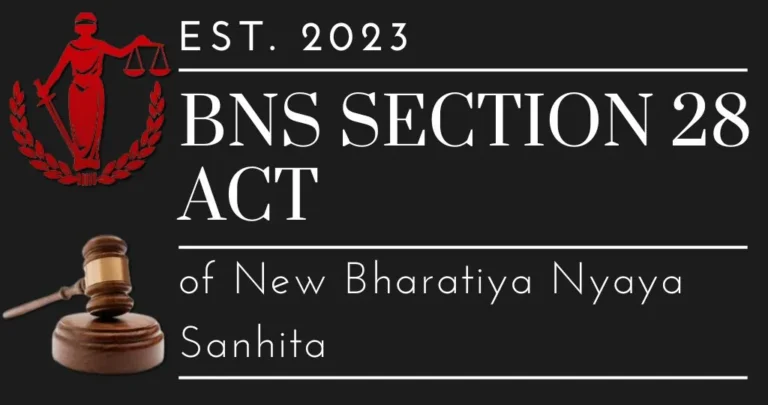
Penalty for Harbouring Robbers or Dacoits: Section 254 of Bharatiya Nyaya Sanhita, 2023
Penalty for Harbouring Robbers or Dacoits: Section 254 of Bharatiya Nyaya Sanhita, 2023
The Bharatiya Nyaya Sanhita, 2023, which replaced the Indian Penal Code and became effective from 1st July 2024, is designed to make the legal system stronger by providing more stringent punishments for a number of offenses. One such provision is Section 254, which pertains to penalties for sheltering robbers or dacoits. This section provides severe penalties for those who knowingly abet persons engaged in robbery or dacoity by providing them shelter or facilitating their escape from punishment.
Explanation of Section 254
For More Updates & Regular Notes Join Our Whats App Group (https://chat.whatsapp.com/DkucckgAEJbCtXwXr2yIt0) and Telegram Group ( https://t.me/legalmaestroeducators ) contact@legalmaestros.com.
Section 254 provides for the punishment for sheltering people who take part in dacoity or robbery. It provides that whoever, having knowledge or the reason to believe that some persons are going to commit or have recently committed dacoity or robbery, gives them shelter with the intention to abet them in committing the offense or escaping legal punishment, will be punished with severe imprisonment for a term that may be extended to seven years, and shall also be punishable with fine.
The law under Section 254 is stringent as it seeks to discourage people from assisting criminals, hence making the implementation of justice easier and discouraging further criminal behavior.
Explanation of Section 254
The explanation makes it clear that whether the dacoity or robbery is intended to be or has been done within or outside India does not make any difference. The law holds everywhere, and providing shelter to persons involved in such offenses is an offense wherever the offense occurs. This worldwide applicability ensures that even when the offense occurs outside the country’s boundaries, the person who gives shelter to the offenders will also be dealt with under Indian law.
Exception: Spouse of the Offender
The subsection contains a significant exception, that its provisions do not extend to cases where the harboring is committed by the spouse of the offender. This exception is made to acknowledge the special relationship between spouses and to understand that spouses might at times act out of loyalty or emotional ties without criminal intent to impede justice.
Connection to Related Sections
Section 254 is within a general category of provisions dealing with harboring criminals. It must be read in context of the earlier sections, which deal with various aspects of harboring offenders:
Section 249 deals with punishment for harboring any offender to protect them from prosecution. The gravity of the punishment depends on the gravity of the original crime.
Section 250 deals with cases where individuals accept gifts or rewards in return for helping to hide an offender.
Section 251 addresses giving gifts or other incentives to someone to encourage them to help conceal an offender.
Section 253 outlines penalties for harboring someone who escapes custody or is wanted for arrest.
Section 254 deals particularly with harbouring a person engaged in the serious offense of robbery and dacoity. These offenses are especially serious as they amount to direct violence to others and endanger public security.
Examples to Illustrate Section 254
Example 1: Harbouring a Robber
Assume that a friend of Ravi, Ajay, is planning to rob a nearby jewelry store, and Ravi is aware of it. Even knowing Ajay’s scheme, Ravi lets Ajay stay in his home and even offers him a shelter before and after the robbery. If the police get to know of Ravi’s involvement in giving shelter to Ajay, he can be sentenced under Section 254 with a maximum of seven years’ imprisonment, along with a fine.
Example 2: Giving Shelter to a Dacoit
Suppose a band of dacoits had just committed a robbery on a village and looted wealth from various houses. After committing the robbery, they take shelter at Ramesh’s farmhouse, where Ramesh keeps them sheltered even though he is aware of their criminal activities. According to Section 254, Ramesh is punishable with severe imprisonment for a term extending up to seven years along with a fine because he willingly provided shelter to the dacoits with the intention of securing them against the legal penalty.
Why the Law is Harsh for Hiding Robbers or Dacoits
Robbery and dacoity are grave offenses which entail threat, violence, and even death or loss of property. Treating the harbouring of offenders in these acts as a heinous crime per se is necessary since it would otherwise allow criminals to go free and possibly offend again. It makes sense, therefore, to dissuade others from providing harborage by using stringent penalties as provided for under Section 254.
The Effect of Wider Applicability
In making it evident that where the offense has been committed or planned is irrelevant, Section 254 guarantees that criminals cannot evade the clutches of Indian law just because they plan or execute their crimes outside India. The universal applicability of Section 254 holds importance in combating cross-border crime and guaranteeing that justice may be sought even if the offense has been planned or committed abroad.
Conclusion
Section 254 of the Bharatiya Nyaya Sanhita, 2023, prescribes rigorous punishment for concealing robbers or dacoits. The legislation seeks to deter the assistance of serious offences by deterring people from supporting criminals who commit robbery or dacoity. By imposing a sentence of up to seven years’ imprisonment and a fine, it acts as a deterrent against those who may otherwise be willing to assist the offenders in evading justice.
This part, together with similar provisions for dealing with the harboring of other categories of offenders, is a critical element of the legislation that seeks to ensure law and order in society. It emphasizes the duty of members of society to work with the police and not to help in covering up criminal activity.





